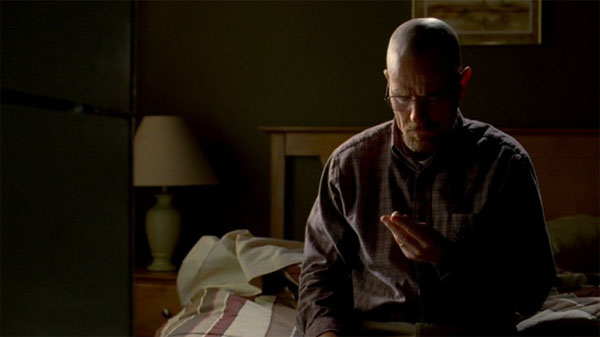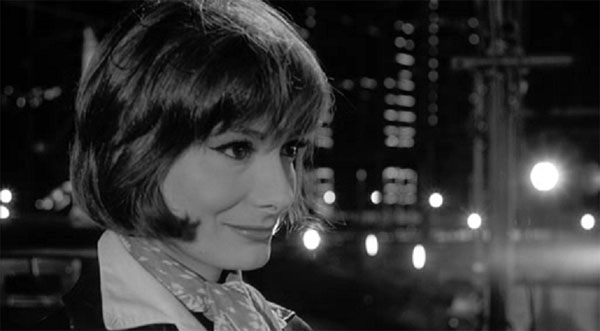“When exactly did film end?” asks David Bordwell, noting that “the digital conversion of cinema has been in the works for about fifteen years.” A year after the publication of his e-book Pandora’s Digital Box, “everybody knows that 35mm exhibition of recent releases is almost completely finished. But let’s explore things in a little more detail, including poking at some nuts and bolts.”
“I like to tell people that TV, as both business and art, is at roughly the same place in its development as cinema was in the late fifties, around the time that the French floated the auteur theory,” writes Matt Zoller Seitz in this week’s TV issue of New York. “We’re still figuring out who the ‘author’ is on TV shows.” And he argues that, yes, showrunners run the shows, but “within the showrunner’s big picture are a series of smaller pictures: the scenes, the moments, the shots. It’s on these smaller canvases that episodic directors work their magic.” Vince Gilligan, who talks to Lane Brown about wrapping Breaking Bad (“In my mind, the ending is a victory for Walt”), argues that “TV is a writer’s medium…. And when executives get excited about getting a superstar movie director to direct the pilot of a new TV show, I think to myself, That’s all well and good, but what happens after that? That superstar director goes away, and you’ve still got 100 hours to fill. Who’s the first person on the ground making those 100 hours happen? It’s invariably the writer.”
“After a series of hate letters to humankind,” writes New York‘s David Edelstein, “Noah Baumbach has fashioned an ode to his girlfriend Greta Gerwig’s galumphing adorableness (they co-wrote the script). Frances Ha is black-and-white and has a French New Wave gloss, along with a soundtrack that quotes Georges Delerue’s theme from King of Hearts.” And it opens this week. Last fall, I posted an initial round of reactions from Telluride and Toronto, and Critics Round Up will be picking it up from there. For now, and because this is such a lovely piece of work, let me just point to one more endorsement, from Richard Brody in the New Yorker: “Gerwig’s Frances—an eternal fledgling dancer at twenty-seven with dwindling status, shrinking income, an evaporating love life, and a fraying best-friendship with Sophie (Mickey Sumner), her soon-to-be-ex roommate, is, in effect, being flayed alive in the big city and somehow manages to smile through it all…. With her exquisitely touching spontaneity and the spin of verbal and gestural invention with which she inflects the slightest interaction—and despite her embarrassingly impulsive self-revelations and equally awkward deceptions—Frances is an artist whose medium is life itself, and Baumbach, his camera open with calm adoration, channels her waves of wonder and possibility.”
Also: Kera Bolonik‘s profiled Gerwig for the cover story of last week’s Voice, Kat Stoeffel‘s chatted with Gerwig and Sumner for New York, and Gerwig‘s written a “riff” for the New York Times: “One Scene, 42 Takes and 2 Hours in a Bathroom Stall.” That 30-second scene is here. Extensive profiles of and interviews with Baumbach and Gerwig: Zach Baron (NYT), Ian Parker (New Yorker), and Filmwax Radio (33’30”).
“What drives a writer to keep writing about cinema in the long run even if she doesn’t make a living by it?” asks Girish Shambu in a guest post for Special Affects, the blog of the University of Pittsburgh film studies program. Girish has also posted links to recent reading.
Revisiting Park Chan-wook’s JSA: Joint Security Area (2000), Michael Smith launches a “Spotlight on S. Korea” series.
“What beloved movie from your childhood holds up just as well today?” asks Matt Singer. And the Criticwire network responds.
In other news. Mohamed Hamidi’s comedy Homeland, “a cleverly structured civil-status comedy, inspired in part by the director’s own return to his father’s village in Algeria after 20 years of absence,” will receive a Cannes Official Selection Special Screening dedicated to school students, reports Variety‘s John Hopewell.
Meantime, with the festival opening on Wednesday, Cannes has been posting clips from films in Competition—among the most recent additions are fresh bits from Amat Escalante‘s Heli, Arnaud Desplechin’s Jimmy P., Hirokazu Kore-eda’s Like Father, Like Son, and Jia Zhangke‘s A Touch of Sin—as well as from films set to screen in Un Certain Regard, Special Screenings, Cinéfondation, Shorts, and Cannes Classics, including the new trailer for Chris Marker and Pierre Lhomme’s Le Joli Mai (1963).
“Carmen Maura will receive a career achievement Donostia Award at this September’s 61st San Sebastian Film Festival,” reports—again—John Hopewell.
New York. Broken Arrow (1950) screens tomorrow as part of Anthology’s Overdue: Delmer Daves retrospective. “Its reputation is as one of the first westerns to portray the natives sympathetically,” notes Justin Stewart in the L, but the “frank, shared-smile sit-downs between James Stewart’s Jeffords and [Apache leader Cochise (toner-bronzed Jewish Brooklyn native Jeff Chandler)] transcend the piety, as do the tense action sequences.”
Toronto. David Davidson notes that the film series Love ‘Em or Hate ‘Em: Controversial Directors in Nayman’s Terms “is on through the month of May to early June, each Mondays (except for the 20th) at 7PM at the Miles Nadal JCC. The class on Paul Verhoeven on May 27th will be the highlight since Adam Nayman has been working on a book on Showgirls (ECW Press).”
In the works. “Charlie Kaufman is to co-direct anticipated animation Anomalisa, which HanWay will take to Cannes,” reports Screen Daily‘s Andreas Wiseman. “Adapted by Kaufman from his own stage play, Anomalisa will be the director’s first animated film…. Jennifer Jason Leigh, Tom Noonan, and David Thewlis are set to lend their voices to the film, reprising their roles from the original stage production.”
Obits. Often called la Greta Garbo italiana and the last great diva of Italian theater, Rossella Falk died last week, aged 86. Though she preferred theater, where she was directed by the likes of Luchino Visconti and Franco Zeffirelli, she did make her mark in films such as Federico Fellini‘s 8½ (1963), Joseph Losey‘s Modesty Blaise (1966), Robert Aldrich’s The Legend of Lylah Clare (1968), Paolo Cavara’s 1971 giallo Black Belly of the Tarantula, and Dario Argento‘s Sleepless (2001).
“Spanish actor Alfredo Landa, an icon of the Spanish film industry whose work sparked a genre dubbed ‘landism,’ died Thursday in Madrid.” Pamela Rolfe in the Hollywood Reporter: “His signature persona of the funny and unsophisticated pre-feminist-movement man earned him lots of laughs in films like Cateto a babor, No desearas al Vencino del Quinto (Thou Shalt Not Covet Thy Fifth Floor Neighbor) and Vente a Alemania, Pepe (Come to Germany, Pepe). He then launched into more dramatic roles in the late ’70s with titles like Mario Camus’s The Holy Innocents, which earned him the best actor nod at Cannes, and Jose Luis Garci’s 1981 film El Crack.” Landa was 80.
“Jacqueline Brookes, an actress who appeared in films and on television but who won her widest acclaim on the stage in New York and around the country, performing the work of Shakespeare, Molière, Pirandello, Edward Albee and other dramatists over a 60-year career, died on April 26 in Manhattan,” reports Douglas Martin in the New York Times. Brookes was 82.
More browsing? Check in with the Film Doctor.
For news and tips throughout the day every day, follow @KeyframeDaily on Twitter and/or the RSS feed. Get Keyframe Daily in your inbox by signing in at fandor.com/daily.





